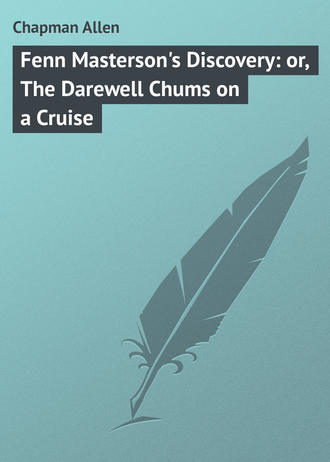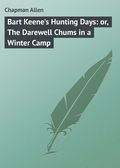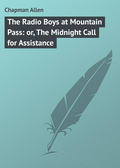
Chapman Allen
Fenn Masterson's Discovery: or, The Darewell Chums on a Cruise
CHAPTER I
AN AUTOMOBILE ACCIDENT
“Hello!” exclaimed Fenn Masterson, as he opened the front door of his home, in response to a ring, and admitted his chum, Bart Keene. “Glad to see you, Bart. Come on in.”
“What’s the matter with you?” demanded Bart, throwing a strap full of books into a corner of the hall, as if he cared very little for the volumes. “Why weren’t you at school to-day, Stumpy?”
“Oh, I was a little hoarse this morning – ”
“What are you now; a mule?” inquired Bart.
“No – Oh, hang it, you know what I mean – ”
“Sure!” interrupted Bart. “You slept in a stable last night, and, when you woke up you were a little horse. I know.”
“I had a little cold this morning,” went on Fenn. “Mother made me stay home. Thought I was going into consumption, I guess. I’m all right now.”
“Gee, I wish my mother had made me stay home to-day,” proceeded Bart. “The algebra lesson was fierce. We all slumped.”
“What! You don’t mean to say the professor floored Frank Roscoe?” and Fenn looked much surprised.
“Yes, and Ned Wilding, too. I tell you, Stumpy, it was a good thing you slept in that barn and became a little horse, or you’d have gone down to defeat on that problem about multiplying sixteen x, y, z’s by the square root of the difference between – ”
“Pooh! That’s easy,” declared Fenn. “I remember it.”
“Easy? Here, let’s see you do it!” exclaimed Bart, and he grabbed the bundle of books and proceeded to take out the algebra.
“Never mind – there’s no hurry about it. I’ll show you later,” spoke Fenn. “Besides, I’ve got to take my cough medicine now. Come on up to my room.”
“Cough medicine?” repeated Bart, with a reproachful look at his chum.
“Yes, cough medicine,” answered Stumpy, seeing that his visitor rather doubted him. “Mom made me take it. It’s awful nasty stuff, full of tar and horehound and pine – ugh! I hate it.”
“Moral, don’t try to fool your mother and pretend you have a sore throat, when you don’t want to go to school for an algebra exam.,” said Bart solemnly.
“No, honest, I did have a sore throat this morning,” declared Fenn. “It’s all better now. I guess I don’t have to take that medicine. But come on up to my room. I’ve just got a fine collection of minerals.”
“Minerals?”
“Yes, I’m going to collect them now. I sent for a small case, of various kinds, and I’m going to add to it. There are lots of minerals in this section of the state.”
“Let’s see, the last thing you were collecting was Indian arrow heads,” said Bart, in musing tones; “before that it was postage stamps, and before that, postmarks. Then, once, I remember, it was jackknives, and before that – ”
“Oh, let up!” begged Fenn. “Are any of the other fellows coming over?”
“Before that it was butterflies,” went on Bart relentlessly. “I guess your mineral collecting craze will last about as long as any of the others, Stumpy.”
“Well, all the others were too much trouble,” declared Fenn, trying to justify himself. “It’s no fun to be sticking stamps and postmarks in a book, and I had to chase all over the country after butterflies.”
“To say nothing of getting on bad terms with half the boys in the school for trading them poor knives for good ones, when you had that craze,” remarked Bart.
“Oh, I intend to make a fine collection of minerals,” declared Fenn. “I’ll not get tired of that. You see minerals are easy to get. All you have to do is to pick up stones as you walk along. You put them in your pockets and, when you get home, you look in the catalog, see what kind they are, so as to label ’em, and put ’em in one of the little numbered squares of the cabinet. Why, collecting minerals is fun. Besides, it’s valuable information. I might discover – ”
“Sure, of course. Oh, yes – you might discover a gold mine or a hole filled with diamonds!” interrupted Bart. “Oh, Stumpy, I’m afraid you’re a hopeless case.”
“Wait until you see my minerals,” asserted the stout youth, as he led the way up to his room. “When are the other fellows coming over?”
“Oh, Ned’ll be along right away. Frank Roscoe said he had to go on an errand for his father. They both are anxious to see what sort of a game you worked so’s to stay home to-day. They might want to try it themselves.”
The two chums were soon busy inspecting the case of stones which Fenn had bought. There were small samples of ore, spar, crystals and various queer rocks.
“There’s a piece of stone I found out near the river,” said Fenn, pointing to a fragment of a bright red color. “Maybe it’s a new kind of ruby. I’m going to show it to a jeweler.”
“It’s red glass!” declared Bart.
“It is not!”
“I tell you it is! Look, it’s a piece of a bottle. You can see where it curved for the bottom,” and he pointed it out to Fenn.
“I guess you’re right,” admitted the collector, as he tossed the red object away. “Never mind, I’ll get some good specimens yet. Hello, there’s Ned’s whistle,” and he looked out of the window, which, as it was late in June, was wide open. “Come on up, Ned!” he called, “Bart’s here!”
“Coming!” cried Ned. “Lower the drawbridge and raise the portcullis! Lord Mount Saint Dennis Morency Caldwalder de Nois approaches!”
“Yes, I guess it is ‘De Noise’ all right,” murmured Bart. “Since he’s been studying French history he’s been getting off such nonsense as that every chance he has.”
“Greeting, fair and noble sirs!” cried Ned Wilding, reaching the door of Fenn’s room, for, like the other chums, he had the run of the house, “greeting, most noble lords of the high justice, the middle and the low. I give thee greeting!”
“And I give thee that!” interrupted Bart, putting out his foot, and, with a sly motion, upsetting Ned as he was making a low, exaggerated bow.
“First down! Ten yards to gain!” he cried good-naturedly, as he arose, for Ned was a lively, quick-witted youth, full of fun, and never serious for more than a minute at a time.
“I hope that jarred some of the foolishness out of you,” observed Bart.
Suddenly a head was poked in the open window, and a voice exclaimed:
“Gentlemen, allow me to introduce myself. I am the original and only genuine second-story burglar!”
“Frank Roscoe!” exclaimed Fenn. “How did you get there?”
“Climbed up over the porch,” replied the newcomer. “I rang the bell until I was tired, and nobody answered.”
“That’s so, I forgot. Mother’s out this afternoon and there’s no one down stairs. But why didn’t you do as Ned did, walk in? The door’s not locked. I didn’t hear you ring.”
“I prefer this method of stealing into houses,” replied Frank, a tall dark youth, as he bounded from the window sill into the room. “It’s more romantic. Besides I needed exercise, and it was easy climbing up the porch pillar.”
“Don’t give us any romance,” begged Bart.
“No, don’t,” advised Ned, rubbing his thigh where he had come down rather heavily. “The days of romance are dead.”
“That’s not the only thing that’s dead in this town,” put in Fenn. “Things are getting rather dull. We need some excitement to keep us awake.”
The two newcomers soon learned the reason for Fenn’s absence from school that day. They examined his cabinet of minerals and made more or less sarcastic comments about his new fad.
“Yes,” went on Bart, after a pause. “I wish we could have some fun, as we did when we were off camping in the woods, last summer.”
“And rescued Frank’s father from that sanitarium,” put in Ned.
“Well, we had a pretty lively time when you slipped off to New York, and the lodging-house keeper held you a prisoner, Ned,” said Bart. “You had some romance then.”
“Not the right kind,” declared Ned. “I’d like some more fun such as we had when the King of Papricka tried to fool us.”
“Sure! When we got carried away in the captive balloon,” added Frank. “That was a time!”
“And do you remember when we fastened the ladder on the donkey’s back, the night we were going to rescue Frank’s father,” suggested Fenn? “How he ran away in the woods?”
“Yes, and how it rained,” put in Ned. “Gee, that was fierce!”
“But we had a good time,” remarked Frank. “Father can never forget how much you boys did for him.”
“It wasn’t anything!” exclaimed Ned. “Say, do you remember when they thought we blew up the school with dynamite?”
“Do I? I should guess yes,” replied Ned.
“Yes, and how Ned thought he was going to become a millionaire with that investment which made him a fugitive!” spoke Bart. “Oh, yes, we had good times then. But we don’t seem to be having them any more. It’s nothing but measly old algebra exams. that no fellow can pass. I wish – ”
But what Bart wished he never told, for, at that instant there came from the street outside a series of sharp explosions, that sounded like a Gatling gun in full operation.
“What’s that?” cried Fenn.
“It’s an automobile!” replied Frank, who was nearest the window. “It’s running away, too, from the looks of it. They’ve opened the muffler and are trying to reverse I guess! Something’s wrong! There’s going to be an accident!”
The other boys crowded up back of Frank to see what was going on. The street in front of Fenn’s house sloped sharply down to a cliff at the end of the thoroughfare. Across the highway was a stout fence, designed to prevent any one from driving over the cliff, which was quite high. Toward this fence a big touring car, which, as the boys could see, contained an elderly gentleman and a young lady, was rushing at furious speed.
“Stop! Stop!” cried Fenn in desperation, thinking the man in the car did not know or realize his danger. “The street ends at the fence! You’ll go over the cliff!”
As the auto whizzed past the house the girl in it gave one glance at Fenn. The youth thought her the most beautiful person he had ever seen, though there was a look of terror in her eyes.
“He can’t stop!” shouted Bart. “Something’s wrong with the machine!”
Indeed this seemed to be true, for the man at the steering wheel was frantically pulling on various levers and stamping, with his feet, on some pedals in front of him.
The young woman in the car half arose in her seat. The man, holding the wheel with one hand, held her back with the other. She gave a startled cry and, a moment later the auto had crashed through the fence, as though it was made of paper, and the front wheels disappeared over the edge of the cliff.
“Come on!” cried Bart. “We must go to their help!”
“I’m afraid they’re dead,” spoke Frank solemnly, as he quickly followed his chums from Fenn’s house.
CHAPTER II
A MYSTERIOUS CAVE
Running at top speed the four boys hastened down the street toward where the automobile accident had occurred. Several other persons followed them.
“They’ve gone over the cliff!” cried Fenn.
“No, the rear wheels are caught on the edge!” declared Ned. “You can just see the back part of the car!”
“But the man and young lady must be pitched out! It hangs nearly straight up and down!” said Frank.
“I wonder if they could possibly be alive?” asked Fenn, as he hurried along, a little in the rear of the others, for, because of his stoutness, he was not a good runner. “I’ll never forget how she looked up to me, as if she wanted me to save her.”
By this time the chums had reached the broken fence that had proved so ineffectual a barrier to the cliff. They leaped over the shattered boards, accompanied by a number of men and boys.
“Gee! They’re goners!” exclaimed a boy named Sandy Merton, peering over the edge of the cliff. “It’s a hundred feet to the bottom!”
“I wonder what caught the auto?” said Bart. “Why didn’t it fall?”
“A wire caught it,” answered Fenn. “Look,” and he showed his chums where several heavy strands of wire, which had been strung on the fence to further brace it, had become entangled in the wheels of the auto as they crashed through. The wire was twisted around some posts and, with the broken boards from the barrier, had served to hold the car from going over the cliff. There it hung, by the rear wheels only, a most precarious position, for, every moment, it was in danger of toppling over.
“But where are the people?” asked Frank, as he peered over the edge of the cliff. “I can’t see them?”
“They’re all in pieces,” declared a gloomy looking man. “They’re broken to bits from the fall.”
“Nonsense!” exclaimed Bart. “Here, let me have a look!”
Lying flat on his face he peered over the edge of the precipice. Then he uttered a cry.
“I can see them!” he shouted. “They’ve landed on the ledge, not ten feet down. They’re under some bushes!”
“Get some ropes, quick!” cried Fenn. “We’ll haul ’em up before the auto falls on ’em!”
“No danger of that,” declared Bart. “They’re off to one side. I’m afraid they’re badly hurt, though.”
“Somebody go for a doctor!” urged Fenn.
“I will,” volunteered Jim Nelson, who had the reputation of being the laziest boy in the town of Darewell. Perhaps he was afraid of being asked to help haul the auto back from the perilous position.
“Telephone for ’em!” called Frank, knowing Jim’s usual slowness, and realizing that the lazy youth would welcome this method of summoning the medical men.
“Tell ’em to come to my house,” supplemented Fenn. “We will carry the man and girl there.”
“Good idea,” commented Frank. “You’ve got more room than any of these houses near here,” for, in the immediate vicinity of the cliff there were only small cottages, and some of them were unoccupied.
“But how are we going to get ’em up?” asked Fenn.
By this time a large crowd had gathered. Some had brought ropes, and there were all sorts of suggestions as to how the rescue should be effected.
“I’ll get them; or at least I’ll go down and put a rope around them, so they can be hauled up,” suddenly declared Frank. “I know how to reach that ledge. There’s not much danger. Where’s a rope?”
Several were soon produced, some neighboring clothes lines being confiscated. It seemed that all the crowd needed was some one to give orders. In a few minutes, with a rope tied around his waist Frank was being lowered over the cliff. Willing hands let him down until he was on the ledge. Then, having fastened the rope about the form of the unconscious young woman, padding it with his coat, so the strands would not cut her, he gave the signal to haul up. There was a cheer as the body was laid gently down on the grass at the top of the cliff, and some one called:
“She isn’t dead! She’s breathing!”
It was harder work for Frank to adjust the rope about the man’s body, as he was very heavy, but the lad accomplished it, and the crowd above hauled the unfortunate automobilist up. Then Frank was raised from the ledge.
“Carry ’em to my house,” cried Fenn. “The doctors will soon be there if Jim hasn’t forgotten to telephone for ’em.”
On stretchers, improvised from pieces of the fence, the bodies, of which that of the girl alone seemed to contain life, were carried to Fenn’s house. The crowd followed but, at the door a constable named Darby, at Fenn’s orders, refused admittance to all save the three chums, and those who had borne the stretchers.
“The doctors will need room to work,” declared Fenn, when there were murmurs at what was his right, to exclude the mob from his home. “I’m glad mother’s out,” he said. “This would scare her into a fit.”
“The doctors are coming,” said Jim, who came into the house a moment later, after the man and young woman had been laid on beds where Fenn directed. “I telephoned to all in Darewell, but only three were home.”
“That ought to be enough,” declared Fenn. “I hope they can save their lives. There doesn’t seem to be any evidences of injuries.”
The medical men, under the direction of Dr. Fanwood, the eldest of the practitioners, made hasty examinations of the two victims of the accident.
“I think we’ll have to operate on the man,” declared Dr. Fanwood. “We’ll need several things from my office. Who can go for them?” and he looked at Fenn, whom he had doctored ever since Fenn was a baby, on the few occasions when that healthy youth needed medicine.
“We’ll go!” offered Frank, Bart and Ned at once.
“I guess we can use all three of you,” decided Dr. Fanwood. “Dr. Kyte and Dr. Feldon will need things from their offices. Now I tell you what to do, just take our horses and carriages, which are tied out in front, and drive after the things. That will be quicker.”
Then, the three physicians having given the chums a list of what they needed, proceeded to get ready for the operation. The girl was in a semiconscious condition, but a hasty examination showed that the worst she was suffering from was shock. She could be left alone for a time.
While the medical men were preparing to attend to the man, Constable Darby kept guard in front of the house, before which it seemed as if half the population of Darewell was gathered. Jim Nelson was sitting in the front hall, ready to go on an errand if needed, but, on the whole, rather hoping that he would not be required to run. The hasty telephoning had been quite a strain on his lazy nature. Fenn, at the suggestion of Dr. Fanwood, remained in the room where the young lady was, to be at hand in case she recovered consciousness.
“My, things have happened suddenly,” thought Fenn, as he looked at the silent form on the bed. “We were just wishing for something like our old adventures again. This seems to promise a good beginning.”
The four boys, who, because of their intimate association, and from the fact that they lived in the town of that name, were known as “The Darewell Chums,” had been through some lively times together, as has been related in the previous books of this series. In the first volume called “The Heroes of the School,” I related how the four took part in a peculiar mystery, and solved it to their satisfaction, though, at one time, when they went up in a balloon, and were captured by the enemy, it looked rather dubious for them. The boys were wide-awake lads, full of energy and resources, and they managed to free themselves from a difficult situation.
Their home town was on the Still River, which flowed into Lake Erie, and Darewell was a few miles from that great body of water, on which they often enjoyed themselves rowing or sailing.
In the second volume of the series, “Ned Wilding’s Disappearance,” there was set down the story of what happened to Ned when he tried to do a little financial business on his own account. He went to New York, and there by some curious mis-chances, he had to hide, almost as if he had committed a crime. But, by the aid of his chums, and a poor lad whom they once befriended, Ned was rescued.
In the third volume, “Frank Roscoe’s Secret,” I told of a queer case of persecution. Frank and his chums went camping and Frank’s manner, which had been not only strange but sometimes unaccountable, became still more curious and bewildering, for one of his good nature. His chums did not know what to make of him, and there was considerable worry on their part.
But it turned out that Frank was the one who had to worry, because of the danger to his father, whom he had always supposed was dead, but who turned out to be alive, though in captivity. How the boys discovered Frank’s secret, and how they helped him to rescue his father was related in the book together with various other happenings during their encampment in the woods.
And now the Darewell Chums seemed to be in for another series of adventures, if Fenn was any judge. The young woman on the bed tossed and turned in the fever of a delirium. The lad became rather frightened, and was going to call one of the doctors, though he knew they must be very busy preparing for the operation.
Suddenly the young woman sat up straight in bed. Her light jacket, which had not been removed, bore many dirt-stains, where she had fallen upon the ledge. She struggled to get it off. Fenn started to help her, thinking one of her arms might be broken. Suddenly she exclaimed:
“The cave! Oh, the cave! It was hidden but I can see it now! And the men! See, there are the men, digging, digging, digging! I must stop them! They will take all – ”
She fell back upon the pillows.
“What cave? Where is it? Can I help you?” asked Fenn eagerly.
“The cave! They are in it!” exclaimed the young woman again. “The mysterious cave! If I could only find it! I must find it – my father – his wealth – search for the cave – I – he – ”
“Yes, yes,” spoke Fenn, advancing to the side of the bed. “Perhaps I can help you find it!”
He hardly knew what he was saying, so great had been the strain of the accident, and so strangely did the words of the young lady affect him.
She opened her eyes, which had been closed when she was talking. A look of consciousness came over her face.
“Was I speaking?” she asked in different tones than that she had used before. “Did I say anything? What has happened? Where am I? Where is my father?”
“The automobile went over a cliff,” explained Fenn. “You were hurt, and so was your father, but not badly, I hope. He is here. The doctors are with him.”
“I must – Oh, let me go to him,” and she arose from the bed. “What did I say just now?” she demanded suddenly. “I know I was unconscious, but I was saying something.”
“It was about a cave,” replied Fenn.
“Oh!” she exclaimed in such a voice that Fenn was alarmed. “I was afraid so! Why did I do it? Forget it, please! Forget that I ever mentioned it! I don’t know – ”
She seemed about to say something more, but her face suddenly became pale, and she fell back on the pillows.
“Doctor!” cried Fenn, very much frightened.
“Ah, I’m just in time, I see,” remarked Dr. Kyte, coming into the room at that moment. “I’ll attend to her now, Fenn. She has only fainted.”







